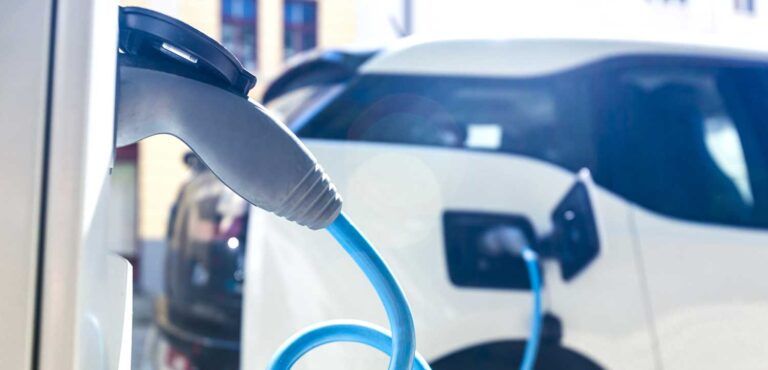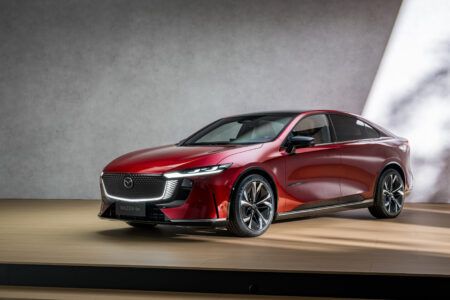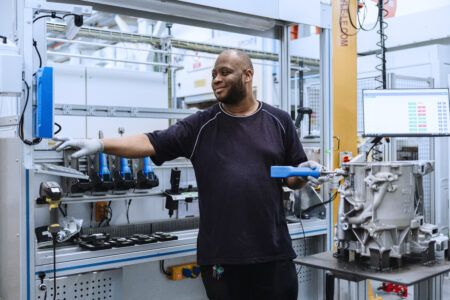In the UK after 2035, consumers will no longer be able to walk into a car showroom and buy a brand new car that uses petrol or diesel. Although petrol stations will not immediately go out of business, as the distribution network for this fuel diminishes, the cost to fill up this way will rise.
In switching to electric cars, we luckily have a replacement fueling network set up already. More than 99.9% of homes in this country are electrically connected and most have a fuse of 60 Amps. As the average home uses in the region of eight kilowatts, equating to about 1.4 Amps, that a home is drawing at any time. This leaves 58.5 Amps which could be used to charge a vehicle. Another advantage is if electric vehicles were charged to full capacity while the sun shone or the wind was blowing, they would have more than enough energy stored to supply and heat homes when the generation levels drop. And there are already systems emerging which allow us to plug our house into a car, rather than the other way around.
However, there are always challenges in transitioning to new and greener sources of energy. To become a reality, the many limitations of battery technology still need to improve, particularly when it comes to lifetime degradation, rare earth metals usage and recyclability. At this point, it is impossible to know how the evolving nature of the technology will impact the design and use of electric vehicles and the dream of long ranges at low cost and size may be difficult to come to fruition.
Options to going electric
At the moment, there are two other technologies that will decide whether electric vehicles stand the test of time or become mostly redundant.
Hydrogen is a highly combustible gas and therefore offers an easy-to-envision alternative to petrol, with the benefit of not giving off greenhouse gases as a byproduct. It is also the most abundant element on earth and can be produced through a number of straightforward chemical reactions.
Hydrogen-powered vehicles are not new, but being the lightest chemical element, it is difficult to store, transport and use. Then there’s the small matter of its combustibility. Alongside this, given the amount needed to fuel our road transportation system, there would have to be huge infrastructure changes to bring the risk levels low enough to be acceptable. Compared to an electrical network, it is also difficult to predict the costs of producing and maintaining a hydrogen version and these implications may impact the reality of this.
The future of transport and driving
By 2030 we may get to a point where road vehicles can mostly drive themselves. If the perfect vehicle based on the number of passengers, their individual needs such as baby seats, and the luggage turned up at the start of a journey automatically, that would lead to huge reduction in energy required and the utilization of the fleet. Most of us currently drive to work alone in a car with enough space for a five person family going on a week’s holiday and for a lot of the rest of the time it sits dormant on a driveway or in a work car park. It’s clearly not the most efficient use of materials.
The haulage industry would also be transformed. Currently, so much of the logistics and costs revolve around the driver and the availability of a vehicle large enough to make it efficient. Without the driver, goods could be moved around in smaller, discrete crates at the optimum time of day, therefore making the use of the road network much more efficient.
When vehicles are not in use, they could be used to store energy from the network or moved intelligently to the most likely places they will be required. This means journeys which are organized in advance will then become cheaper. While this may have the unfortunate side effect which occurs within the train ticketing system, where last minute travel is penalized by higher fares, overall, however, the cost should be insignificant compared to that of owning and operating a vehicle as we do currently. The advent of fully autonomous vehicles will also render lots of the issues around batteries and electric cars redundant.
As mentioned at the start of this article, the future is likely to be a mixed bag, with the majority of personal journeys completed in mostly autonomous vehicles leased on ‘per trip’ basis, as this would be the cheapest option. While we seem to be putting our faith in the future of electric vehicles it is still not clear whether they will be our friends or pose more problems.





